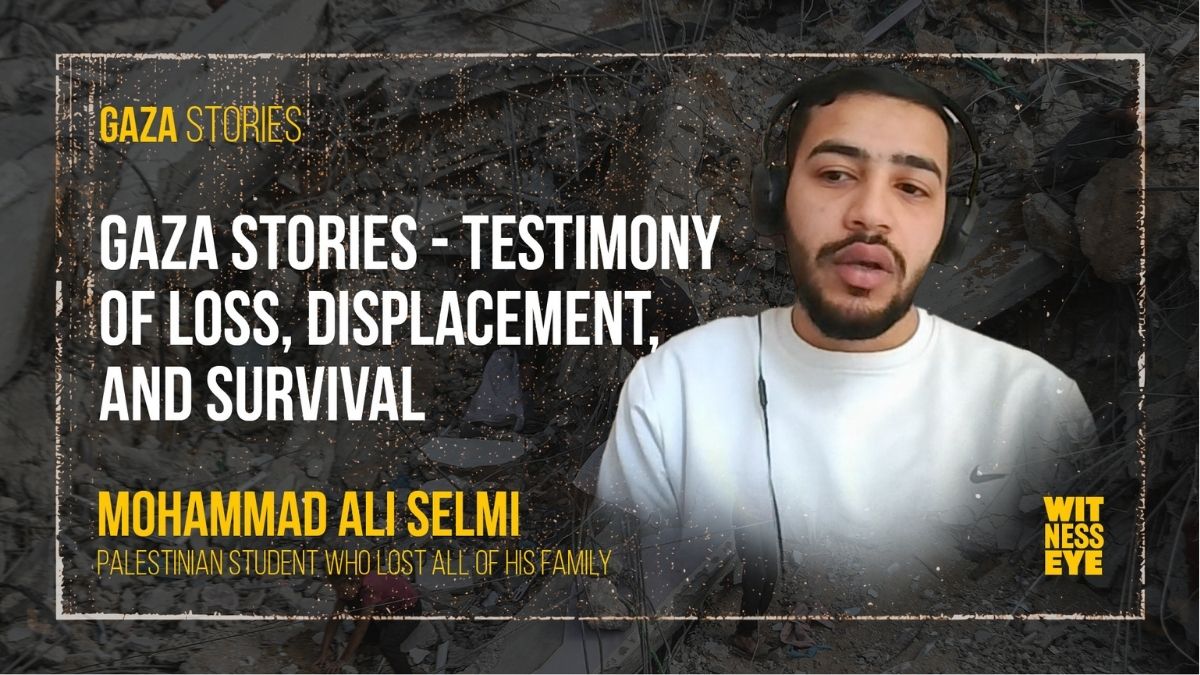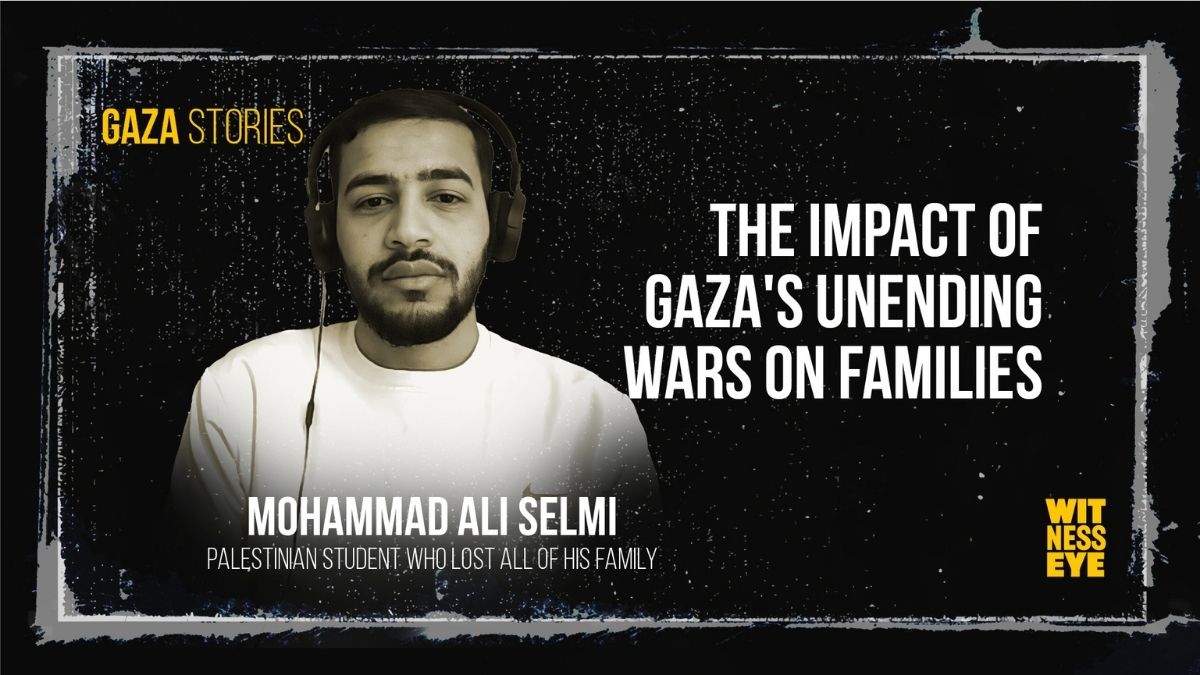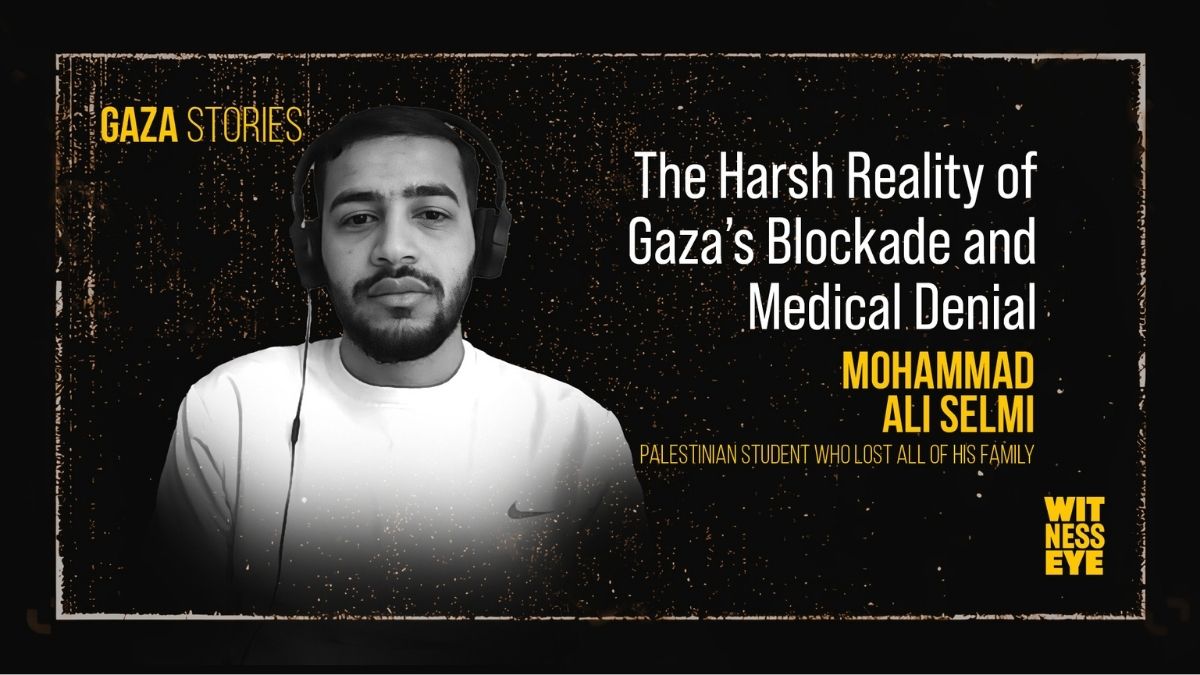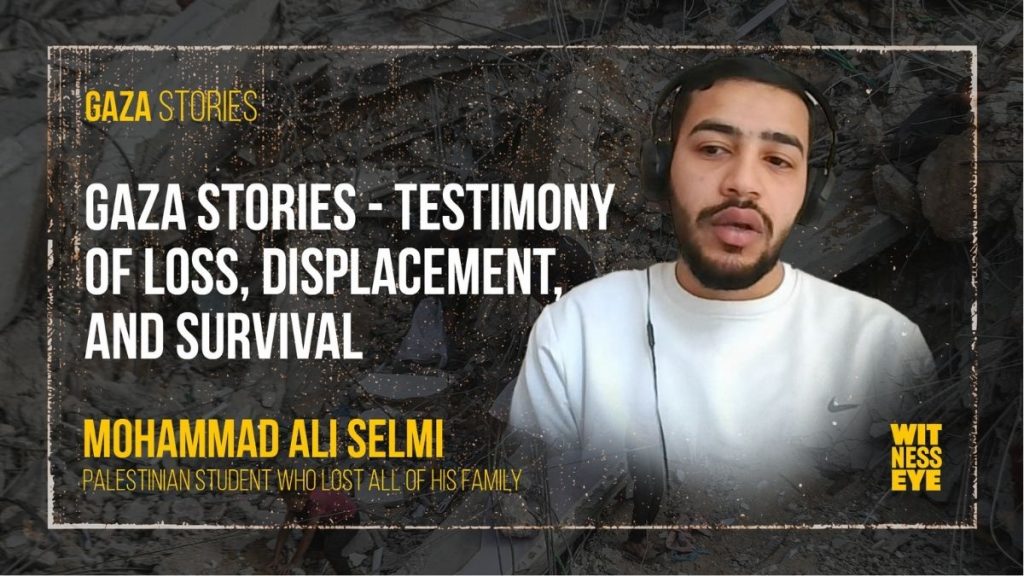
Gaza Stories are not merely accounts of war but the profound testaments to human endurance in the face of unimaginable adversity. Mohammad Ali Salmi’s story reflects the depth of suffering endured by those trapped in the horrors of war, forced displacement, and the devastating effects of the Gaza Genocide. His family’s journey is a poignant reminder of the resilience and strength it takes to survive amidst devastation.

The Impact of Gaza’s Unending Wars on Families
Before the war, Mohammad’s family in Gaza enjoyed a relatively peaceful life in the Al-Zaytoun neighborhood. Mohammad’s family, like many others in Gaza, was living in stability, with his father working as a government employee and his mother as a housewife. Mohammad’s siblings were employed in various fields, including law, banking, and teaching. Life, as he recalls, was good. “We were happy. My father worked for the government, and my mother took care of us. Life was stable,” Mohammad reflects, his voice full of nostalgia for a time before the war.
However, that stability was violently shattered when the war arrived in Gaza. “Everything changed after October 7th,” he shares. The Salmi family, like many others, was forced to leave their homes in search of safety. In Mohammad’s words, “We were displaced more than five times. I don’t remember the exact number, but I remember the fear. The constant need to move to avoid bombings, the feeling of never knowing if your home would still be standing when you returned.”
As the Gaza War escalated, so did the suffering of those living in its path. For Mohammad’s family, fleeing from their home in Al-Zaytoun marked the beginning of a harrowing journey. They initially sought refuge in the Al-Nadeem area within Gaza, thinking it would be safer. “But even that wasn’t enough. We were forced to leave and move south to Khan Younis after receiving threats. The situation was dire,” Mohammad explains.
The Relentless Displacement of Gaza’s Civilian Population
For most, displacement in Gaza is a tragic but familiar reality. The Salmi family was no exception. Moving from place to place in a desperate search for safety, they eventually ended up in a school in Khan Younis. Despite this, their hardships were far from over. “Even after settling in Khan Younis, we were bombed again. The residential complex in Hamad City was destroyed, and we had to move again,” Mohammad recalls. With each move, the Salmi family lost more: more belongings, more memories, and most painfully, their sense of security.
As the war continued, even the slightest hope of stability faded. Mohammad’s family found themselves living in constant fear. The sound of bombs, the sight of their homes being destroyed, and the persistent threat of death hung over them every day. “We stayed in a school for months. We slept on floors, used makeshift shelters, and sometimes had no choice but to sleep on the street,” he shares. The harsh conditions were compounded by a severe shortage of food, water, and medical supplies. Like many others in Gaza, Mohammad’s family was forced to survive on whatever scraps they could find. “There were times when we couldn’t find clean drinking water for days. We had to rely on canned food,” he recalls.
This intense suffering was not unique to Mohammad’s family. Across Gaza, families were enduring similar struggles. The lack of basic resources, coupled with the constant threat of violence, created an environment where survival was not guaranteed. “It’s impossible to describe the pain of having nothing,” Mohammad says.
“You don’t even have the basic things to survive—clean water, food, medicine. And still, you are expected to endure.”
Gaza’s Children: Innocent Victims of War
One of the most heartbreaking aspects of Mohammad’s story involves his niece, who was born just a week before the war started. “She was born with two holes in her heart. The doctors told my brother she would need heart surgery,” Mohammad explains. However, with the war ravaging the region, medical care became increasingly difficult to access. Gaza’s hospitals, already overwhelmed with the influx of casualties, were soon destroyed or rendered unusable. “The hospitals were bombed. Even if the hospitals were still standing, they were overcrowded and lacking supplies,” Mohammad recalls. The situation left many families with no option but to watch as their loved ones suffered.
Despite the desperate situation, Mohammad’s family tried everything they could to ensure the survival of his niece. They applied for medical transfer to neighboring countries, but their efforts were thwarted at every turn. “We had hoped to send her abroad for treatment, but the borders were closed, and the situation only worsened,” Mohammad shares. The failure to get the necessary medical attention in Gaza is a tragic representation of the human rights violations Gaza faces daily during war. “The medical facilities were so overwhelmed that even the simplest treatments became impossible to access,” he explains.

The Harsh Reality of Gaza’s Blockade and Medical Denial
In a particularly heartbreaking turn, Mohammad’s niece was selected for medical transfer through the World Health Organization. However, just as they were ready to leave, Israel implemented a travel ban, preventing children from leaving Gaza. “It was a political decision,” Mohammad explains, his voice shaking. “A sick child, denied medical treatment simply because of a political decision.” This political denial of healthcare is a tragic irony, as it underscores the way in which individuals, especially children, are subjected to the consequences of decisions made far beyond their control.
Despite the trauma, Mohammad’s niece was eventually allowed to leave Gaza for treatment, but the journey was long and fraught with bureaucratic hurdles. “Even when she was allowed to leave, it wasn’t easy. The conditions were horrendous, and the process was delayed multiple times,” he recalls. This experience exemplifies the numerous Gaza Testimonies of families who are caught in the crossfire of political decisions that strip them of their dignity and basic human rights.
The Martyrdom of Mohammad’s Brother: A Symbol of Gaza’s Civilian Suffering
The emotional toll of the war was further compounded by the loss of Mohammad’s older brother, Haitham. Haitham, who had been living separately from his family in northern Gaza, was killed in a targeted drone strike while attempting to use a public internet point in Salah al-Din Street. “He was just trying to connect with us,” Mohammad recalls, his voice breaking. “He was a civilian, and yet he was targeted.”
Mohammad’s brother, like so many others, was caught in the ruthless targeting of civilians by drones and bombings. His story is one of countless Gaza War Crimes—innocent lives lost under the guise of military operations. “It wasn’t just my brother. Many others were killed that day. Children were killed. It was a massacre,” Mohammad recounts. The indiscriminate targeting of civilians is a grim reality for many in Gaza, where daily life becomes a struggle for survival amidst overwhelming violence and destruction.

The Gaza Tribunal and the Call for Justice
In light of these injustices, the Gaza Tribunal represents a crucial step toward seeking accountability for the atrocities committed in Gaza. For Mohammad and countless others, the tribunal serves as a glimmer of hope that justice will eventually prevail. “The international community must take responsibility for what is happening in Gaza,” Mohammad insists. “We need justice for the lives lost, for the families destroyed, and for the countless innocent civilians suffering under occupation.”
The Gaza Tribunal Evidence gathered by organizations like Witness Eye plays an important role in documenting these crimes and ensuring that those responsible are held accountable. “The truth must be told,” Mohammad says. “The world must know what is happening, and those who are responsible must answer for it.”
Life as a Student in Expatriation: Mohammad’s Struggles in Turkiye
Now studying in Turkiye, Mohammad is far from the horrors his family endures in Gaza, but his pain remains ever-present. “Even though I am physically here, my heart is with them,” Mohammad admits. “Every day, I fear for their safety. I am constantly worried about them. And there is nothing I can do.”
His life as a student in Turkiye has been marked by psychological trauma. “When the war started, I couldn’t focus on my studies. How can you, when you know your family is being bombed every day? You’re just waiting to hear news about your family, hoping they are safe,” he says. The emotional toll of being an expatriate while your family faces the daily horrors of war is immense. “It’s hard to feel at peace when you know your loved ones are suffering,” he adds.

The Emotional Cost of War: A Palestinian’s Expatriation
For many Palestinians like Mohammad, life in expatriation is not a choice, but a forced reality. Though he sought education abroad, the war and displacement have followed him, emotionally and mentally. “When I left Gaza, I thought I was escaping the violence. But the violence came with me, in my heart and mind,” he says. “Every day, I live with the fear and guilt that I’m here, while they’re there, suffering.”
His story is a testament to the resilience of Palestinians living in expatriation. While they may escape physical violence, the emotional and psychological scars of war continue to haunt them. “I thought leaving Gaza would give me peace, but instead, it has made the pain harder to bear,” he shares. Gaza Stories are not just about those left behind; they are also about those who escape, carrying the weight of their people’s suffering with them.
Now, hear the testimony of Mohammad Ali Salmi in his own words—student, expatriate, survivor—carrying Gaza’s grief, memory, and unyielding call for justice into the record of history.
